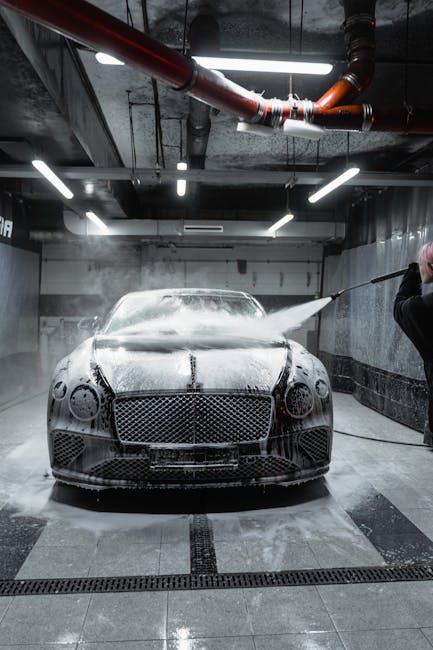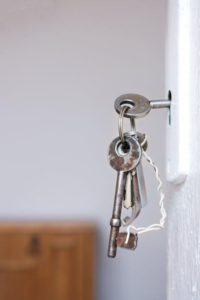As winter’s chill settles in and frost begins to lace the edges of your windows, the last place you want to worry about is the security of your garage. Yet, cold weather can be a stealthy adversary, turning sturdy locks into frozen barriers or leaving them vulnerable to unexpected damage. Winter-proofing your garage locks isn’t just about convenience-it’s a crucial step in safeguarding your home and belongings against both the elements and potential intruders. In this article, we’ll explore practical tips and expert advice to ensure your garage locks remain reliable, no matter how harsh the winter winds blow.
Table of Contents
- Understanding the Impact of Cold Weather on Garage Lock Mechanisms
- Choosing Weather-Resistant Materials and Coatings for Durability
- Effective Lubrication Techniques to Prevent Freezing and Sticking
- Insulation Strategies to Shield Locks from Harsh Winter Conditions
- Regular Maintenance Tips for Ensuring Smooth Operation Year-Round
- Q&A
- Closing Remarks

Understanding the Impact of Cold Weather on Garage Lock Mechanisms
Cold weather can wreak havoc on garage lock mechanisms, primarily due to the contraction of metal components and the intrusion of moisture. When temperatures plummet, metal parts within the lock can shrink, causing misalignment and making it difficult to insert or turn the key. Additionally, moisture inside the lock can freeze, creating ice blockages that prevent the mechanism from functioning smoothly. This combination of metal contraction and ice buildup not only hampers lock performance but can also lead to permanent damage if the lock is forced to operate under these conditions.
Key effects of cold weather on garage locks include:
- Freezing of lubricants, reducing smooth operation
- Expansion and contraction of metal leading to warping
- Trapped moisture turning into ice, causing internal blockages
- Increased wear from attempt to force frozen locks open
| Issue | Impact | Winter Solution |
|---|---|---|
| Metal Contraction | Misalignment of lock pins | Use cold-resistant lubricants |
| Moisture Intrusion | Ice blockages inside lock | Apply waterproof lock spray |
| Frozen Lubricants | Increased key resistance | Switch to silicone-based lubricants |

Choosing Weather-Resistant Materials and Coatings for Durability
When preparing your garage locks for the unpredictable winter months, selecting materials that can endure harsh conditions is paramount. Opting for locks constructed from stainless steel or brass not only enhances longevity but also resists corrosion caused by moisture and ice buildup. These metals retain their structural integrity even when exposed to freezing temperatures. Additionally, incorporating protective coatings such as powder coating or zinc plating adds a vital barrier against rust and wear, effectively shielding your locks from the biting cold and wet climates.
To further extend the life and functionality of your garage locks, consider treatments that provide added resistance to weather damage. Here’s a quick look at common coatings and their benefits:
| Coating Type | Protection Level | Ideal Use |
|---|---|---|
| Powder Coating | High | Outdoor metal surfaces |
| Zinc Plating | Moderate | Light to moderate exposure |
| Epoxy Coatings | Very High | Extreme weather conditions |
- Choose locks with built-in weather-resistant finishes.
- Reapply protective coatings annually for maximum effectiveness.
- Pair materials and coatings to suit your regional climate.

Effective Lubrication Techniques to Prevent Freezing and Sticking
When temperatures plunge, garage locks can become stubborn, often freezing or sticking due to moisture and cold. The key to avoiding this common winter woe lies in applying the right lubrication method, ensuring smooth operation throughout the colder months. Start by cleaning your locks thoroughly-remove dirt and old lubricant residue-before applying. Opt for lubricants specially designed for low temperatures, such as graphite powder or silicone-based sprays, which resist freezing better than traditional oils. These lubricants penetrate the lock mechanism without attracting debris, making them ideal for winter care.
To maintain your locks in optimal condition, follow these easy yet effective steps:
- Apply lubricant sparingly to avoid buildup
- Work the key gently in and out to distribute lubricant evenly
- Repeat lubrication monthly during the coldest periods
- Keep lock covers clean and dry to minimize moisture entry
| Lubricant Type | Best For | Winter Benefits |
|---|---|---|
| Graphite Powder | Keylocks & Deadbolts | Non-greasy, freeze-resistant |
| Silicone Spray | Padlocks & Springs | Water-repellent, smooth action |
| Teflon-based Lubricant | Mechanical Locks | Long-lasting, dust-resistant |

Insulation Strategies to Shield Locks from Harsh Winter Conditions
To defend your garage locks against freezing temperatures and icy winds, consider wrapping them in materials that retain warmth and prevent moisture buildup. Foam tape and insulated covers work wonders by creating a snug barrier that reduces exposure to harsh elements. Another clever tip is to place weatherproof silicone sealant around lock edges. This not only stops water from seeping in but also blocks drafts that can cause the internal lock components to freeze.
Simple preventive measures can be enhanced by keeping an emergency lock warming kit on hand. This can include items like petroleum jelly or graphite powder to lubricate and shield moving parts from corrosion and stiffness. Below is a quick comparison of popular insulation materials for garage locks, outlining their benefits and usability:
| Material | Insulating Ability | Ease of Application | Water Resistance |
|---|---|---|---|
| Foam Tape | High | Easy | Moderate |
| Silicone Sealant | Medium | Moderate | High |
| Lock Covers | High | Easy | High |
| Heat Shrink Tubing | Medium | Challenging | High |

Regular Maintenance Tips for Ensuring Smooth Operation Year-Round
Maintaining your garage locks throughout the year is essential for preventing unexpected malfunctions, especially during the colder months. To keep them operating smoothly, regularly lubricate the key components with a silicone-based or graphite lubricant. Avoid oil-based products, as they can attract dust and grime, leading to clogging. Additionally, routinely inspect the locks for any signs of rust or wear, as even minor corrosion can hinder the mechanism’s performance when exposed to freezing temperatures.
Another crucial practice is to ensure the surrounding weatherstripping and seals remain intact and functional. These elements help keep moisture out, which can freeze inside the lock and cause stiffness or jamming. Consider these essential maintenance steps for locking systems:
- Clean debris: Use a soft brush or compressed air to remove dirt from keyholes.
- Check alignment: Misaligned locks create unnecessary strain and wear.
- Protect from moisture: Apply a water-resistant barrier if necessary.
Q&A
Q&A: Winter-Proofing Your Garage Locks
Q1: Why is it important to winter-proof garage locks?
A1: Winter brings cold temperatures, moisture, and ice, all of which can cause garage locks to freeze, rust, or become difficult to turn. Winter-proofing ensures your locks remain functional and secure throughout the season, preventing inconvenient lockouts and potential damage.
Q2: What are common winter problems with garage locks?
A2: The main issues include freezing due to moisture settling inside the lock, corrosion from salty road spray or snow melt, and stiff mechanisms that resist turning because of cold-induced contraction or dirt buildup.
Q3: How can I prevent my garage lock from freezing?
A3: A practical step is applying a graphite-based lubricant or a silicone spray to the lock cylinder. These products displace moisture and keep the internal components moving smoothly. Avoid oil-based lubricants in winter as they can thicken and attract grime.
Q4: Are there any DIY tips for protecting garage locks in winter?
A4: Yes! You can cover the lock with a snug plastic bag or use a lock cover designed to shield against snow and ice. Regularly wiping the lock clean and dry after exposure to moisture also helps reduce ice formation.
Q5: What should I do if my garage lock is already frozen?
A5: To thaw it safely, warm your key with a lighter for a few seconds, then slowly insert and turn it. Avoid forcing the key as it may break. Alternatively, applying a lock de-icer spray or a small amount of hand sanitizer can melt the ice inside.
Q6: When should I consider replacing my garage locks for winter?
A6: If your locks are old, rusty, or consistently malfunctioning despite maintenance, it might be time to upgrade to newer, weather-resistant models. Look for locks with protective coatings or built-in covers designed for harsh climates.
Q7: Can temperature fluctuations affect lock reliability?
A7: Absolutely. Repeated freezing and thawing cycles can cause metal to expand and contract, loosening internal parts and inviting dirt ingress. Proper winter-proofing minimizes these effects, safeguarding lock integrity over time.
Q8: Are smart garage locks better suited for winter conditions?
A8: Many smart locks are designed with weather resistance in mind, often incorporating sealed components and remote access features that reduce the need to physically handle the lock in extreme cold. However, they still require regular maintenance and battery checks during winter.
Q9: What role does insulation play in protecting garage locks?
A9: Insulating the garage door and entry points helps maintain more stable temperatures inside, reducing the likelihood of freeze damage. While not a direct lock treatment, better insulation supports an overall winter-proof environment.
Q10: Can professional locksmiths help with winter-proofing?
A10: Definitely! Locksmiths can assess your locks for winter readiness, apply professional-grade lubricants, recommend replacements, and install lock covers or upgraded systems tailored to your climate. Their expertise ensures peace of mind during the frosty months.
Closing Remarks
As winter’s chill sets in, taking a little extra time to winter-proof your garage locks can save you from the frostbitten frustration of a frozen or malfunctioning entryway. With simple steps and a bit of preparation, you can ensure your garage remains a secure and reliable fortress against the cold. So, bundle up your locks like you would yourself-protect them wisely, and watch winter’s grip lose its hold before it even begins.





